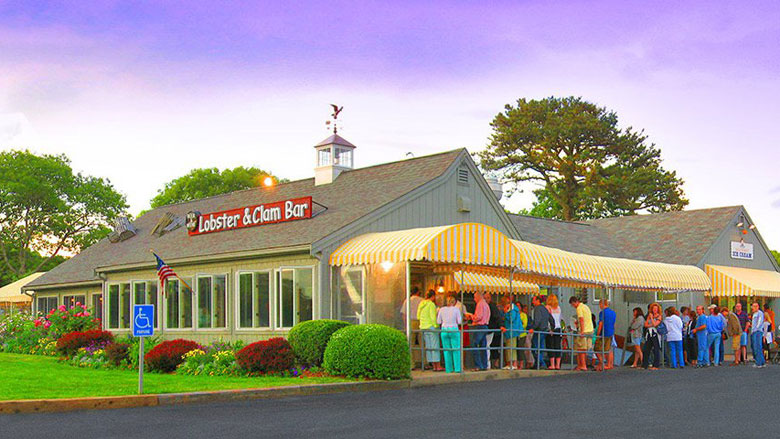Government aside, Happy Days still at Arnold’s
By James P. Freeman | July 18, 2016, 6:13 EDT

On a postcard perfect summer morning, sitting at a picnic table beneath a large scrub pine Nathan “Nate” Nickerson, the hearty and high-toned proprietor of Arnold’s Lobster and Clam Bar, gets animated and even agitated at the thought of ever more “government intrusion” affecting his business and livelihood.
Arnold’s is located off Route 6 in Eastham on the Outer-Cape. Like many small businesses, a place like this is where old-school values and new world realities intersect. To say things have changed in nearly 40 years of ownership would be a massive understatement.
Watching the bustle of prep work around him, Nickerson, 65, casually dressed in t-shirt and shades, says that owning the place has been a rewarding struggle, one he has ridden “by the seat of [his] pants,” and survived with common sense as his operator’s manual.
Labor, unquestionably, is his “biggest challenge,” and with that, government — lots of it.
Twenty-five years ago, local kids comprised the bulk of his staff. Now, Nickerson says, he “can’t hire Americans anymore.” Not one sought an application from last December to this April. He surmises there are a confluence of reasons: greater affluence on the Cape, a reduction in work ethic, family and sports commitments, and colleges starting earlier — before the critical Labor Day weekend.
So he relies upon the H-2B program, which allows a temporary work visa for foreign workers with a job offer for seasonal, non-agricultural work in the U.S. For Nickerson, it is vital; about 75 percent of his staff are foreign born, from countries such as Serbia, Bulgaria and Jamaica. They are educated, speak 2-3 languages, have a tremendous work ethic; in short, he says, “the cream of the crop.” He even attended the wedding of one former worker in Moldova. The international composition to his staff underscores the complexities of today’s global economy and the impact on small businesses.
The program, definitely helpful in providing workers (between 2,500 and 3,500 workers participate annually on the Cape alone), is a dual-edged sword. Because it involves the Departments of Labor, State and Homeland Security, it is overly complicated — necessitating a blizzard of forms, as well as time management, compliance, and lawyers.
The law requires Nickerson to pay workers comparable wages to Americans, pay their meals in transit, and secure lodging, among other things. All this for a summer season, the peak of which lasts just eight weeks. This year, the approval process was delayed by the government, throwing havoc into staffing levels for many establishments.
While Nickerson believes the food supply should be protected, he laments over a “bigger and bigger bureaucracy” overseeing his toils. There is state and local permitting. There are audits from the IRS. There are labor, health and meals tax commissioners. And there are endless regulations telling him what he can and can’t do. It is expensive. As he concludes, “government is an impediment to free enterprise.” Incidentally, because of labor laws and “this insane system,” Nickerson says that he is entitled to collect unemployment benefits due to the seasonal nature of his business. He does not.
Given government’s unruly meddling in so many aspects of his operation, he is not sure he would, or even could, open a business in restaurant services today. But he has survived.
Nickerson purchased the venue — first known as Gertrude’s Beach Box, a drive-in clam shack straight out of a Hollywood set — in 1977. Aching for a return to America’s post-war euphoria in an era of disco and discontentment, and inspired by the restaurant in television’s “Happy Days,” he renamed the place Arnold’s. It became a retro juke-joint. As Nickerson explains it, “We had to do something to separate from the competition so we did the Fonzi 50s thing.”
But the 50s faded, and economics dictates evolution. Chrome and leather have been replaced by cyclists and leisure-wear. The Cape Cod Rail Trail, running behind his building, became popular in the 1980s and a bucolic mini-golf course was constructed in the 2000s. Today’s theme is classic Cape Cod: nautical and casual. Generations of returning patrons are what keeps him in the game.
On any given day, over 2,000 people are served – each is given a hand-written receipt (no credits cards are accepted). And nearly 1,000 oysters and quahogs are consumed.
Listening to Nickerson is a seminar in small business management, where he applies good old Yankee discipline and ingenuity – striving for efficiency, almost as a counter to government inefficiency. He marvels at the cost of raw materials ($177 for a gallon of clams), so he wrestles with pricing menus fairly (insurance, mortgage and maintenance bills still accrue in the off-season). He is always present, monitoring every facet of the business, amidst controlled chaos. He hauls his own trash and helps park cars at night. And with the world going green, lobster shells go to a local farm as compost.
Henry David Thoreau, who walked these parts over 150 years ago, wrote of Cape Cod that, “a man may stand there and put all America behind him.” Today, however, Nickerson would like to put much of what he calls the “awkward hand of government” behind him. Nevertheless, he remains cautiously optimistic, and talking with him one can almost hear the melody of the theme song… “These days are all… (Those Happy Days).”

James P. Freeman
James P. Freeman is a New England-based writer and former columnist with The Cape Cod Times. Read his past columns here.











